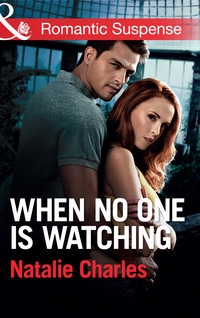Das Buch kann nicht als Datei heruntergeladen werden, kann aber in unserer App oder online auf der Website gelesen werden.
Buch lesen: "When No One Is Watching"
The red-hot passion between them isn’t exactly an open-and-shut case…
To find her missing sister and an attacker she can’t remember, criminal profiler Mia Perez teams up with gorgeous Boston P.D. lieutenant Gray Bartlett. Their prime suspect: a psychotic serial killer. But when Mia’s prints are found on the gun used in recent murders, Gray doesn’t know what to think. Is the brainy beauty he’s falling for being framed?
Mia finds herself incredibly attracted to the hero risking his life and career to protect her. Yet she keeps a deadly secret of her past from Gray. Now she needs more than his desire—she needs him to prove her innocence, find her sister…and keep her alive.
He went in for another kiss, but she placed her hand squarely on his chest to stop him.
“No. You need to go to work.”
The spell was broken, and just in time. What were either of them thinking, groping each other on the sidewalk like a couple of teenagers? Getting involved like this was a mistake—a big one. She twisted out of his embrace and smoothed her hair.
“Mia.” His voice was hoarse. “Don’t do this.”
“You should be thanking me.” The kiss left her feeling disheveled, but as she adjusted her dress, she realized there was little actually out of place. She just felt out of order. “You can’t be seen with me, and you definitely can’t be seen kissing me. That’s a great way to end your career.”
“No one’s watching.”
“Someone’s always watching, Gray.” Mia’s gaze darted around self-consciously. She knew he’d taken a bit of a risk having dinner with her, but that could have been explained away. A kiss in front of her apartment, however…
Dear Reader,
There are several reasons why this book is special to me. One is that I wrote it while my sweet newborn son slept cradled in my arms. Another is that it’s set in Boston, one of my favorite cities. Yet another is that it was simply fun to bring Gray and Mia to life.
The title of the book, When No One Is Watching, is a reference to former UCLA basketball coach John Wooden, who said, “The true test of a man’s character is what he does when no one is watching.” Isn’t every mystery story, at its heart, about what happens when no one is watching? Aren’t they all, to a certain extent, about the character of those caught up in the middle? It seemed like the perfect quote to inspire a book about an investigator who follows a trail of clues and learns that she may not be the person she believes herself to be.
I always hope that my readers enjoy reading my books as much as I enjoyed writing them. For this one, I also hope you have someone special to snuggle up with while reading, as I did while writing.
Warmly,
Natalie
When No One Is Watching
Natalie Charles
NATALIE CHARLES
is a practicing attorney whose day-job writing is more effective for treating insomnia than most sleeping pills. This may explain why her after-hours writing involves the incomparable combination of romance and suspense—the literary equivalent of chocolate and peanut butter. The happy sufferer of a lifelong addiction to mystery novels, Natalie has, sadly, yet to out-sleuth a detective. She lives in New England with a husband who makes her believe in Happily Ever After and two children who make her believe in miracles.
Natalie loves hearing from readers! You can contact her through her website, www.nataliecharles.net.
MILLS & BOON
Before you start reading, why not sign up?
Thank you for downloading this Mills & Boon book. If you want to hear about exclusive discounts, special offers and competitions, sign up to our email newsletter today!
Or simply visit
Mills & Boon emails are completely free to receive and you can unsubscribe at any time via the link in any email we send you.
For Talia and Luke, with all of my love. I hope that one day you will experience the thrill of having your heart stolen the way you’ve stolen mine.
Contents
Cover
Back Cover Text
Introduction
Dear Reader
Title Page
About the Author
Dedication
Chapter 1
Chapter 2
Chapter 3
Chapter 4
Chapter 5
Chapter 6
Chapter 7
Chapter 8
Chapter 9
Chapter 10
Chapter 11
Chapter 12
Chapter 13
Chapter 14
Chapter 15
Chapter 16
Chapter 17
Chapter 18
Chapter 19
Chapter 20
Extract
Copyright
Chapter 1
Ten months after Lena Perez vanished, a woman’s body was found along the banks of the Charles River. The call woke Lieutenant Gray Bartlett an hour before his alarm was scheduled to go off.
“I don’t want to speak too soon, but it looks like it could be the work of Valentine,” the sergeant said. Gray didn’t need to hear anything more. Valentine meant his case, his killer. Another dead body bringing down his stats.
He rolled out of bed and staggered to his feet, sweeping his palm forehead to chin and back again before stumbling to the kitchen. One of these days he would feel as though he lived here, in this bare-walled shell of an apartment. He stood in his boxer shorts in the center of his kitchen, gulping the thick remains of yesterday’s coffee and passing his gaze across the empty countertops and the sparse table-and-chair set. He tossed his mug into the sink.
The first forty-eight hours were crucial. After that the likelihood of solving this crime went down precipitously. Gray had set the mental timer already, wondering how many hours he was behind. Had the crime occurred two days ago? Five hours ago? He was out the door, showered and shaved, in less than ten minutes. Not quite the timing he’d been able to keep when he was in the military, but Boston P.D. wasn’t the Marines.
Traffic into the city was light. The entire city felt emptier now that colleges had cleared out for the summer. He made the drive in record time and pulled his vehicle into line behind a string of squad cars parked against a hill overlooking the Charles. At the top of the embankment stood a crowd of people craning their necks like geese to glimpse the carnage. The responding officers had strung yellow police tape widely, blocking off the cement stairs that led down the embankment to the river, and closer to the scene, joggers were being redirected. They were looking backwards, too.
It’s the stuff of nightmares, folks. Keep jogging.
A young officer stood in front of the steps leading to the scene, blocking his entry. “Sir, this is a crime scene. You’re going to have to keep moving along.”
There was a time when Gray might have taken such a statement as an affront to his authority, but somewhere along the years, he’d become accustomed to it, and then he’d stopped caring altogether. It was a perk of the job that he was able to dress in plain clothes—today, jeans and a black polo shirt. No need for a uniform when you spent your workday sifting through crime scenes and interviewing junkie witnesses, but the plain-clothes policy backfired when the endless stream of new kids didn’t know who the hell he was. He reached into his back pocket and flashed his credentials. The officer immediately stepped to the side.
“Sorry, Lieutenant,” he mumbled, lifting the crime scene tape to allow Gray entry to the stairs.
The young officer’s face was fat with youth, but lots of seasoned officers still looked fresh out of the academy. What identified this kid as a rookie were his blue eyes: wide and restless with unfamiliar fear. Gray had seen eyes like that at almost every crime scene he’d ever encountered. They were the eyes of disillusionment.
“Officer Hodges,” Gray read from his name tag. “You’re one of the responding officers?”
“Me and Officer Neill,” he replied. His cheeks were flushed and sweaty, and he glanced uneasily toward the bottom of the stairs as if he didn’t quite believe this was happening.
“First on the scene.” Gray pulled his shoulders back as he eyed the young officer. “You lose your breakfast?”
“Sir?” The kid’s wide eyes snapped back to meet his. “No. No, sir.”
“Then you did better than me when I saw my first body.”
“Lieutenant!”
The shout came from the bottom of the embankment, where Gray observed Officer Jude Langley waving to him. Gray brushed past the young officer without offering a condescending pat on the arm, dipping below the crime scene tape to walk the steps to the scene below. “Officer Langley,” he said as he reached the bottom stair.
“Sir. Sorry it’s so early.”
Sometimes Gray had to remind himself that Langley was a Worcester native. He acted more like some transplant from a region of the country where people still said please, thank you and sorry. He liked Langley. The kid pulled long hours and didn’t give him lip. But if he had one criticism, it was that he was too nice. Someone would take advantage of that.
“Unless you put the vic there, you have nothing to apologize for.” Gray accepted the pair of latex gloves the officer held out to him. “What’s the story?”
“A jogger found her. ME’s on the scene, but nothing’s been moved.”
Gray nodded, slipped the gloves on his hands and approached the small crowd gathered ten yards away. The medical examiner was crouched beside the body, but he rose when he saw the lieutenant. Gray had worked Homicide long enough to know all of the MEs, their strengths and shortcomings, which ones played well in front of a jury, and which ones came across as deader than the bodies they carved. Dr. Jonah McCarthy was one of the doctors whose blood still ran warm. In Gray’s opinion, he was one of the best.
“Doc.” Gray nodded to him in solemn greeting. He never made pleasantries at a death scene.
“Good to see you, Lieutenant.” He sighed and crouched down beside the body again. “Young female, probably early to mid-twenties.” Right down to business.
Around them the crime scene unit continued its work. Outdoor crime scenes were exposed to animals, insects and weather. The dead might have all the time in the world, but the living had to move quickly to avoid losing evidence.
Gray squinted at the body from behind his sunglasses. The early summer morning was already promising to be scorching, and the sun rippled across the water like flashes of silverfish. She was lying in the grass, her toes pointed toward the shore as if sunbathing. It didn’t take a medical degree to see that the woman had met a violent end delivered by the edge of a knife. It didn’t take a law degree to know that he was looking at a murder, not a homicide.
“I thought she was pulled from the river?” The vic’s hair and clothing were dry, and her features didn’t carry the characteristic bloat of floaters.
“No, although the body is slightly damp, probably from condensation,” McCarthy said. “She hasn’t been here long, either.” He gently pried open an exposed wound on the vic’s arm. “Temperature’s been above ninety degrees for three days now, and no blowfly larvae. They’re just starting to find her.” As if on cue, a fly landed on her cheek.
Gray crouched next to the doctor, trying not to reel at the stench of death and grateful he’d received the call before breakfast. The victim’s face was frozen in a grimace, and her limbs appeared stiff. “The body’s in full rigor?”
“Yes. She was most likely killed sometime overnight.”
“Dumped here early this morning,” Officer Langley said, pointing to the earth. “No blood on the ground.”
Gray frowned and surveyed the surrounding area. “Have you been able to locate the site where she was killed?”
“Not yet,” said Langley.
“Keep looking.” He nodded at the ME. “What about cause of death?”
“I’ll perform a full autopsy, but it looks like what you’d expect.” He gestured with a gloved finger as he reviewed the evidence. “She was stabbed by a serrated knife before she died, and she saw it coming.” He pointed to the cuts on her forearms and hands—evidence she’d tried to block the attack. “There are a lot of wounds. Someone was angry about something.”
Gray turned away to stare out at the Charles, where life continued as usual. White sails already billowed against the wind, pulling boats across the water. Not far away from this death scene, people were enjoying a pleasant Saturday morning.
An unfamiliar voice cut through his thoughts. “Langley, you’ll want to look for gravel and clay.”
Gray whipped around to see a woman coming from the stairs he’d just walked down. Her slender figure was clothed casually in jeans and a blue tank. Her hair was pulled away from her face and secured at the back of her neck in a messy knot, but auburn tendrils grazed her cheeks. With one hand she clutched a small stainless-steel travel mug, and with the other she shielded her eyes from the sun, leaving untouched the pair of sunglasses that dangled from the center of her tank.
She pointed to the victim. “Her knees are torn, and there’s gravel and dirt in the cuts.” She pointed the same hand at the path along the Charles. “This path is asphalt. The injuries would be different if she’d been killed here.”
“Excuse me.” Gray stepped in front of her, blocking her view of the body. No one was allowed on his scene unless authorized, and he’d never met this woman. “This is an active crime scene. What’s your role in this investigation?”
She faced him, still shielding her eyes, and then lifted the pair of sunglasses and slid them on her face. “There, that’s better.” She reached into her back pocket and removed a business card. “I’m Dr. Mia Perez. I’m an associate professor of psychology at Northeastern.”
An associate professor? She looked as if she was only in her twenties. He glanced to the top of the embankment. “Who the hell let you in here?”
She set her jaw firmly but spared a tight smile. “The officers know me. I’ve done some work for the Boston P.D. It’s nice to meet you, too.”
“What kind of work?”
“Criminal profiling. I’ve provided some insight on cold cases that has led to convictions.”
Gray squinted at the simple business card with disinterest before handing it back to her. “With all due respect, none of that answers my original question. What’s your role in this investigation?”
Her mouth twitched. “In my experience, when someone says ‘with all due respect,’ they actually mean the opposite.” She nodded curtly at the business card. “Keep it. I have plenty of them. And as to your question, I was asked to be here.”
Gray’s eyes narrowed. “By whom?”
“Me, sir.” Officer Langley stepped forward, bobbing his head nervously. “She was working with Lieutenant Mathieson last summer on the Valentine case, and I heard this was a young woman, so...” He stood dumbly in place.
“So what, Officer?” Gray knew he didn’t have to do much to appear physically imposing, and now he just pulled up to his full height, rested his hands at his sides and waited for the explanation. “You thought this woman might be one of Valentine’s victims? He hasn’t killed in nearly a year.”
“About ten months,” said Mia. “Serial killers often take breaks in between killings. Officer Langley called me to the scene because this vic fit the profile, and because I might be helpful if this was Valentine’s scene.”
Valentine. Blame the media for the stupid moniker. A little over a year ago, bodies began to pile up in Boston. Three bodies and one missing person later, a reporter started calling the perp Valentine because an anonymous source let slip that a single killer was suspected, and that this killer left flowers at the scenes. What the reporter couldn’t know was how apt the name truly was, because the police hadn’t disclosed that Valentine had removed the heart from each of his victims. A vile souvenir, no doubt.
Officially, Valentine was a bogeyman, a figment of that reporter’s imagination. “Do we think this is the work of a single killer? It’s too soon to tell,” said the chief at a press conference when the Valentine article came out. No one at the Boston P.D. was prepared to utter the words serial killer, and a year later, no one had. Serial killers didn’t just generate hysteria in the public—they attracted the FBI, and Gray needed federal involvement in his cases like he needed another homicide file on his desk. When his predecessor retired, Gray inherited the Valentine file and the sleepless nights that came with it. All of his worrying amounted to squat, because once the chief denied Valentine’s existence, Valentine stopped killing.
“Like that fairy in Peter Pan,” an officer quipped one day. “He dies if you don’t believe in him.”
Someone should have named him Tinker Bell.
“Valentine doesn’t exist. Not officially.” Gray kept his side to her and spoke to Officer Langley instead. “And we bring profilers on board only after CSU has had the chance to process the scene.”
“That’s not always the best idea, Lieutenant.”
He spun to face her, and Mia continued. “I’ve pointed out evidence that CSU has missed on more than one occasion. Once CSU leaves the scene, this evidence can’t be used in court because the chain of custody has been broken.” She shrugged. “That’s why it’s better if I see the scene while it’s being processed rather than later.”
Gray bristled. No one told him what best practices were. “Now, wait a damn—”
“I made a mistake,” said Officer Langley. “I shouldn’t have invited her without your knowledge. Lieutenant Mathieson would have...” He shook his head. “But I should have run it by you first.”
“Lieutenant Mathieson is retired. Valentine is my case now.” He glanced at Mia, who was watching him intently. “We’ll talk about this privately, Langley. Later.”
“Yes, sir.”
Her mouth was pulled into a tight straight line. “I haven’t caught your name, Lieutenant.”
“Gray Bartlett.” It came out as more of a growl. He pointed to her travel mug. “What’s that? Coffee? It’s not allowed at the scene.”
“Sorry, I got the call while I was out and I came right away,” she said, setting the mug on the lowest step. “It’s monkey-picked oolong. Do you drink tea, Lieutenant?”
Gray rubbed his eyes beneath his glasses. This all had to be some kind of bad dream. That, or someone was pranking him. “No, I don’t drink tea.”
“I drink it for the antioxidants, though I load it with sugar.” She smiled. “That probably defeats the purpose, wouldn’t you think?”
He was certain he didn’t have any opinion whatsoever about the interplay of sugar and antioxidants in her monkey tea. “What, exactly, have you been working on with regards to the Valentine case, Ms. Perez?”
“It’s ‘Doctor,’” she said, “and I’ve been working on a profile of Valentine—assuming he exists.” The corner of her mouth quirked at the little jab. Cute. “Mostly I’ve had to rely on police files, but there’s nothing like seeing a scene firsthand.” She brushed her hands together, apparently eager to begin work. “Don’t worry, this isn’t costing taxpayers a dime. I volunteer my time with the department. It complements my academic research.”
“Dr. Perez has consulted with me on some of her academic work,” Dr. McCarthy said. “Fascinating.”
“Oh?” Gray’s interest was only mildly piqued.
“I’m researching biological origins for psychopathy,” she said. “Other researchers have examined brain scans of psychopathic criminals and found an abnormal structure that may correlate with criminal activity.” She paused, and then a smile, slow as honey, spread across her lips. “I see I’m boring you, Lieutenant.”
She was awfully perky for this hour of the morning. Maybe there was something to that weird tea of hers. “You lost me at biological origins. And I don’t see what brain abnormalities have to do with homicide.”
“So you were listening.” She squared off with him and began talking animatedly. “It’s the old ‘nature versus nurture’ debate. How is it that so many people can experience bad childhoods, but only some of them will engage in criminal activity as a result?”
“Not all criminals come from broken homes. Some serial killers came from loving families.”
“Exactly.” Her hands moved when she spoke, her body lit with passion. “Just like not all psychopaths become criminals. I’m trying to understand why we behave the way we do. Wouldn’t it be interesting to isolate a brain structure that predisposes a person to criminal activity? Then we might begin to truly understand the criminal mind. It doesn’t stop there. We may be able to identify physical characteristics of the brain that influence other behaviors, as well.”
He made a valiant effort not to roll his eyes. Hadn’t he seen some brand of similar optimism a thousand times? And each was equally grating. “Don’t tell me. You’re the kind who thinks it’s possible to know another person. To truly know and understand them.”
“Of course. To an extent.”
“What’s that mean?”
“I believe we operate within certain reasonably predictable parameters,” she said. “Our lives are comprised of stressors and responses. It’s my job to try to understand why individuals respond in a particular way to the stressors they encounter.”
“I’ll save you some time. I’ve worked in this job for long enough to know that you can never understand,” Gray said flatly. “You want to boil human behavior down to brain structure? People will surprise and disappoint you.” He shook his head. “No one knows who they are or what they’re capable of when tested. Not me, and not you.”
She stood in place, locking his hidden gaze with her own. Slowly, a smile worked at the corners of her lips, and she took a step forward, closing the space between them. “Anyway, Lieutenant, I promise I won’t distract you or anyone here from their work. I know how to make myself invisible. But while I’m here, I might be able to help you with this scene.”
Gray dragged his gaze across her figure again, making no attempt to hide his appraisal. She was long limbed, curvy and attractive, with high cheekbones and a gracefully arched nose. He had the utmost faith in the men and women who worked beneath him, but any woman who looked the way Mia did was going to present some kind of distraction. “I only allow law enforcement professionals at my scenes,” Gray said. “Stand right where you are, take a good look and then leave the way you came. I’m feeling generous, so I’ll give you five minutes.”
“Fine,” she said, to his surprise. “I’ll take what I can get.” She calmly snapped on a pair of latex gloves. “I may not have graduated the police academy, but I promise you I know how to behave around a dead body.” Her hands found her hips, and she faced him in a silent challenge. “With all due respect, Lieutenant, you’re blocking my view.”
He didn’t move, except to fold his arms across his chest. “What’s your interest in the Valentine case, anyway?”
In all the years Gray had worked with Lieutenant Mathieson, he’d never known him to work with profilers. In fact, Mathieson had referred to profilers with derision more than once, calling them charlatans and “tea-leaf readers.” Gray wanted to know how Mia had managed to convince Mathieson not only to allow her onto the Valentine case, but to put her on the list of persons to call anytime someone matching the profile of one of Valentine’s victims turned up. It was no small feat.
Mia grew quiet. “It happens to be a very personal matter for me.”
“Personal? How?”
This time, she didn’t flash a smile. “My sister was one of Valentine’s victims.”
* * *
Mia should have taken the pill, because her bones and viscera already trembled inside of her skin. Instead she’d nestled it in her pocket, full of good intentions. She’d take it if she needed it, but not a second sooner. Even more than the sometimes-crippling anxiety, she hated those pills and the way they clung to her esophagus, but sometimes she needed help functioning.
It’s not Lena, she thought, releasing her breath from the vise in her chest. She couldn’t have handled seeing that, and yet part of her desperately wanted the not knowing to end. That was the worst part about having a loved one go missing: not knowing whether she would one day pass Lena on the street or pick up the phone to hear her voice. Or open the front door to see police officers charged with delivering the worst possible news.
It’s not Lena.
Mia fingered the pill in her pocket, clutching it against a wad of lint. She hadn’t touched police work in the months since she was injured, and she couldn’t exactly say she missed it. Still, she felt its tug on her, perhaps from some need to bring order to her small corner of the universe or to feel useful again. Here I go, she thought wryly. Her illustrious return to normalcy, where normal meant poring over the handiwork of psychopaths in her spare time. She let the pill fall again to the bottom of her pocket and stared at the stiff body of the woman in front of her. Was this Lena’s fate, too?
“I’m sorry about your sister,” said Gray, his tone shifting to a place somewhere between near-warmth and not-unkindness. “What was her name?”
“Lena Perez. She was a grad student at Boston University. She vanished last August. Before you think I’m some serial killer groupie, I took no interest in Valentine before then. I started working on the case last summer when Lena went missing.” Eager to avoid elaborating, Mia cocked her head at him. “Look, I’m not here to contaminate your scene and create trouble. I’ll stick to five minutes if you’re serious about that, but can I at least walk around a bit?”
He was like a stone wall, filling up her line of vision with his broad shoulders and arrogance, but she saw him flinch as he considered the request, and then he stepped aside. “You can walk, but I’m going with you.”
How gallant. She stifled a groan and didn’t respond other than to shrug and finally step around him to examine the victim.
The woman was fully clothed in jean shorts and a novelty T-shirt. Her feet were bare, her toenails painted a dark pink. “She doesn’t look like she was dressed to go out. She may have been first attacked in her home,” Mia mused, mostly to herself. “Was she a student?”
“We don’t have an ID,” said Gray.
Poor girl. Mia traced her gaze over the sad figure. The woman’s eyes were filmy and stared into nothing. Mia pointed to a wilting bouquet of flowers nestled beside her left arm. “What’s with the flowers?”
“They were left with the body,” said Dr. McCarthy. “Red roses mixed with white carnations. What do you think—is Valentine back from vacation?”
Mia frowned, folding her arms across her chest. She’d memorized the Valentine files, spending hours studying the crime scene photos and autopsy reports. This scene was wrong.
She felt a gaze and looked up to see Gray watching her. “You don’t think so, Dr. Perez.”
When she’d first spotted him from the top of the embankment, she swore her heart had stopped. He was unexpected, standing like some marvelous Greek sculpture by the bank of the river, the fine, straight angles of his body incongruent with the ugly chaos over which he loomed. The morning was hot, but the blood in her cheeks ran still warmer at the intensity of his stare. If he weren’t so grouchy, she might have found him attractive.
“It’s all wrong,” she said, shaking her head. “The flowers, for one. It’s a cheap arrangement, something you’d buy from a grocery store. Valentine has never left bouquets like that.”
“There’s a first time for everything.”
“No.” The word flew from her lips on instinct, and she scrambled to produce a basis for that conclusion. “That would be like a fashionista dressing in cheap clothes. It’s not who he is. Valentine leaves a single kind of flower, and the choice is always symbolic. The flowers aren’t meant to honor the woman—they are meant to say something about her. This arrangement is all wrong. The body is posed improperly, too.” She pointed to the straight arms. “Her arms should be crossed over her chest, and the flowers should be in the center, over her sternum.” She paused as she braced herself. “Doc, what about her heart?”
McCarthy reached forward and gently felt along the victim’s sternum. “Valentine cuts through the bone. This sternum appears intact.”
“No,” Mia repeated, breathing easier. “This isn’t Valentine.”
“Are you saying we have a copycat?” Gray said.
“I didn’t say that, but you can’t ignore the similarities. Also—” she gestured to the gaping wounds on the victim’s palms “—Valentine restrains his victims. We’ve never found defensive wounds.”
Gray removed his sunglasses and blinked against the glare. Mia watched him out of the corner of her eye, not wanting to be too obvious. He looked as if he were carved out of marble, but behind his dark eyes was a softness. She’d always believed the eyes were the window to the soul, and she wondered what he was hiding behind that wall he’d constructed to protect himself.
He knelt beside the body, his brow tense with concentration. “Valentine may have screwed up this time,” he said. “Maybe she broke free of the restraints.”
“But there are no ligature marks on her wrist,” noted Dr. McCarthy. “There’s no evidence she was ever restrained in the first place.”
“The media doesn’t know about the bonds or the missing heart,” Mia said. “A copycat wouldn’t know, either.”
“Hey, wait a second.” Dr. McCarthy pressed a gloved hand to the victim’s side. “Since when does Valentine carry a gun?”
Die kostenlose Leseprobe ist beendet.









